#rethinking incarceration
Explore tagged Tumblr posts
Text
Kamala Harris does want "transgender surgery on illegal aliens that are in prison", btw.
So since Trumpists are getting mad enough about the jokes to actually cite their sources, I thought I'd put the source out into my left extremist commie faggot echo chamber, too.
The claim originates from an ACLU questionnaire she filled out for her 2020 presidential candidacy, specifically this section:

She wasn't given a new questionnaire for 2024, and has stated that while her policy on some things may have changed, her values had not. (This most likely means she moved more to the center to appease larger demographics and cut corners to reach compromises. The basic politician stuff.)
It boils down to this: If you're in prison, whether for "illegal" immigration or other crimes, you rely on the state to provide you with necessary amenities, like food and health care. Her argument isn't "hell yeah everyone in prison should get sex changes for free". It's "gender affirming surgery is a necessary medical procedure. If you are in the states care while this becomes necessary, the state should provide it." If you're outraged by your tax money being used on this, consider the massive amount of people being incarcerated in for-profit prisons, on your dime. Then ask yourself if maybe a prison reform might be in order.
Worth noting: In 2015, while Attorney General, Kamala Harris actually argued against providing gender-affirming surgery to an incarcerated trans woman, claiming that HRT and psychotherapy were sufficiently covering her medical needs. She has since obviously changed her stance and assumed responsibility. (I would like to take this moment to remind my fellow left extremist commie faggots that "willingness to learn and rethink your views" is infinitely more valuable than "perfect from the start and unwilling to listen to anyone")
Also found in the source: This image of Kamala Harris participating in the 2019 San Francisco Pride Parade, wearing what I believe to be a sequin rainbow embroidered denim jacket.
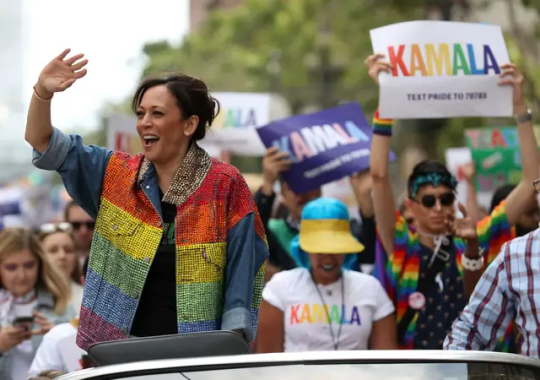
I encourage you to read the provided CNN article and the answers to the ACLU questionnaire, as they give great insight into her values.
TLDR: Based.
#we dont have to get into the fact that most prisons fail to provide bare necessities to inmates because you make more money that way#thats not what the post is about#it is frankly baffling to me that the orange wet bag somehow referenced an actual policy stance#i wasnt aware he knew how to do that#fox news had covered it the morning of the debate so i guess thats how i found out about it#but i didnt know he knew how to read#transgender#transgender surgery on illegal aliens that are in prison#politics#us politics#kamala harris#election 2024#queer#trans#ramble#still think that one guy in my comments was a bot tho lmao#better a bot than this stupid#long post#go vote#vote blue#register to vote#vote so we can have transgender surgeries on illegal aliens that are in prison
3K notes
·
View notes
Text

It’s amazing with how little screentime Walters got, Sonic Movie 3 made me rethink his entire character! With new perspectives of his history, it changes everything.
Before, we just saw him as Olive Garden Guy. Just a standard government official meowing with our heroes. But after the third movie, he’s so much more.
MAJOR SPOILERS BELOW
As we speculated before, Walters was there during Shadow’s time. But he was not like the other officers. When he met Maria, he treated her kindly. You could get the vibe he was more of a rookie. Even though later on Maria and Shadow got into all kinds of shenanigans, there wasn’t any indication that this bothered him. He was one of the more down-to-earth members of the facility. Then came the day of the accident. When everything went wrong. When the military tried to take Shadow by any means. But Walters wasn’t one of them. He was against it. And one thing he said, made me rethink everything I thought about him.
“Those are children!”
That line. He says “children.” Plural. The only ones there were Gerald, Maria and Shadow. He wasn’t just referring to Maria. Despite what he was, despite being an alien, despite the experiments, Walters saw Shadow as a kid. Which makes what happens next even more tragic. He tried to stop the soldiers from hurting them, but his interference caused the explosion that killed Maria. Can you imagine how he must have felt? And that’s what led to Shadow’s imprisonment. Walter himself made the decision, with Shadow being too powerful to be left alone or be destroyed. It’s not an easy choice.

Walters takes no satisfaction in sealing Shadow away. He doesn’t want to do this. But with the power Shadow has, and what others could do to him, it’s the only thing he can do. This had weighed on his mind for 50 years. The death of a child, and a cruel incarceration of another. It’s like a double betrayal for Shadow.
Because of what happened to Shadow, that’s why he treated Sonic the way he did. He had to be as distant and unattached as possible with anything relating to the blue hedgehog to prevent what happened before from happening again. But with Shadow’s release, Walters had to confront past and tell Team Sonic the truth. The way he speaks is completely different. Not the normal military commander, but a man telling a tragic story. He even starts off with saying “Shadow’s story began a lot like yours, Sonic.” He noticed the similarities, that’s why he told the team.
And in his final moments, he gives Sonic the cannon key. In a way, he trusted Sonic and his friends with this more than G.U.N. Perhaps that was his way of making amends. He hoped that they could reach out to Shadow before G.U.N. found him. Maybe that’s a stretch, but I think, in the end, Walters made the right choice in trusting them.
#sonic movie 3#sonic movie 3 spoilers#sonic movie spoilers#commander walters#shadow the hedgehog#sonic the hedgehog
204 notes
·
View notes
Note
Hi! I'm currently researching prison abolition, both for the sake of becoming better educated about it and because I plan to write a paper on it for class. Two questions for you:
First— what books/articles/videos/any other resources on the topic would you recommend? I've been doing some research on my own, but I'd love to have some more sources.
Second— what solutions do abolitionists offer for people who pose immediate threats? I'm struggling to find a solid answer on this. I know it's going to vary based on who you ask! Just looking for some possible answers. Mostly, I've seen this question answered by redirecting focus towards prevention of the circumstances that lead to this kind of behavior, and obviously that is important and should be the main focus, but I'm not sure what possible methods there are for people who already exist who are a threat to others' safety.
(I especially have a hard time with this question because I'm coming at it from an anarchist lens and I don't believe there should be any sort of carceral system or any governing power, but I don't know how this sort of problem can be dealt with without there being some sort of power structure).
If you don't have an answer for that second one, or just don't feel like answering, that's alright! Thanks for your time :))
Hi!
I'm going to list out a bunch of random resources--this is a very incomplete list, just with a few things that came to mind first.
Articles:
Journalism from currently incarcerated writers:
Prison Journalism Project
Scalawag Abolition Week
Marshall Prison Project
Prison Writing on Prison Abolition by empty cages collective and incarcerated workers organizing committee
Other articles:
Truthout's Road to Abolition
Reports/infographics/organizations:
Advancing Transgender Justice: Illuminating Trans Lives Behind and Beyond Bars By Vera Institute of Justice and Black and Pink
Critical Resistance.
SWOP behind Bars
HEARD
Books:
Change Everything by Ruth Wilson Gilmore
Assata: An Autobiography by Assata Shakur
Disability Incarcerated by Liat Ben Moshe
We Do This 'Til We Free Us: Abolitionist Organizing and Transforming Justice by Mariame Kaba
Are Prisons Obsolete? By Angela Davis
The New Abolitionists edited by Joy James
Captive Genders: Trans Embodiment and the Prison Industrial Complex by Eric Stanley & Nat Smith
Golden Gulag by Ruth Wilson Gilmore
Beyond Survival: Strategies and Stories from the Transformative Justice Movement edited by Ejeris Dixon and Leah Lakshmi Piepzna-Samarasinha
In terms of your second question:
short answer, it cannot be a one-size-fits-all solution--any abolitionist future needs to have a wide variety of options for addressing harm that are able to actual address the particular circumstances of harm and meet the needs of the people in that particular context. Harm is an incredibly broad category that can differ so much depending on context. It feels difficult to just give one broad answer for "this is what we do about harm"--it seems necessary to have a different response to someone breaking into your house versus sexual violence versus bigoted physical violence and on and on and on.
Long answer: You're right that a lot of abolitionist thinking focuses on preventing harm and fundamentally changing a lot of the circumstances that are currently causing harm in people's lives. A lot also focusing on rethinking our ideas of safety, violence, harm, and crime, and untangling all the ways a carceral state has shaped our views on those concepts. (this article titled Reclaiming Safety by Mariame Kaba & Andrea J. Ritchie is an important read for thinking about how the concept of safety is constructed in our society). But all that being said, you're right that part of building an abolitionist future requires us to have a way to respond to harm when it does occur, because change doesn't happen overnight and we need those skills now. And these abolitionist responses to harm are something that are already happening now in so many ways in so many different communities and neighborhoods--a lot of people aren't just talking about it using the terminology of prison abolition. For me, it feels really important to start by thinking about what we're already doing and look for ways we can increase our own capacity to respond to harm and to care for our community.
I don't have all the answers, but I'm going to list out some examples of ways that people are already responding to harm without prisons. i don't necessarily think that all of these approaches are applicable to every situation or that they would be the ideal response in a future when we have more options, but i do just want to emphasize that there are things that people are trying right now:
making sure that someone who caused harm isn't able to be in positions of power in organizations/work/community spaces, and making people aware of the harm that was caused.
meeting the material needs of survivors of harm--mutual aid, getting access to housing, resources, etc.
de-escalation training, having people in community equipped to step in to situations where harm is being caused. (i know a few places where this is more-or-less organized--some neighborhoods where people have sort of a neighborhood watch thing going on so people know they can call that group instead of the cops if they need emergency support. )
building up things like peer respite and many other alternatives for supporting people through madness--i have a post discussing the question of alternatives to psych wards for people labeled a "danger to others."
directly intervening in situations where harm is being caused: physically showing up to keep each other safe
financial reparations
community accountability processes focused on creating accountability for bigoted violence, gender based violence, etc.
and a bunch more ideas--I'm not going to list out every possible thing I could think of here.
I'd really recommend reading Beyond Survival, which is a trying to answer some of these questions through looking at examples of things that are already working, and challenges the idea that transformative justice is just community accountability processes where everyone has to sit down at a table together to talk and the survivor just ends up retraumatized. (some authors in the anthology talk in depth about times in which that kind of process would actually increase danger to survivors, in fact.) They also make a lot of room to talk about the experience of being a survivor who has all these complex emotions and feelings towards whoever has caused us harm, and makes a lot of room for messy, complicated feelings of anger or desires for retributive harm.
Some of the examples of transformative justices responses that they share include a public letter campaign to address an abuser who was popular in movement spaces, community created research databases tracking racist violence and murders, community led murder investigations through different tactics including documentary filmmaking, family members stepping in to confront abusers and remove children from unsafe spaces, building up community first aid and medical knowledge to reduce the amount cops get called, a toolkit for transformative justice plans within youth spaces, community defense groups, including groups prepared to do physical defense, and so many more examples of things that people are trying.
I'll also link the creative interventions workbook, which is a really extensive toolkit for thinking of ways to respond to interpersonal violence.
A frequent criticism of prison abolition is that it's not practical--that our suggested responses to harm are impossible and could never work. And I can understand why people respond that way. It can be really frustrating to see people list out a lot of things that wouldn't work yet where you live because your neighbors are bigoted, or you're currently incarcerated, or you live in an inaccessible city with no in person community, etc. That anger feels meaningful, because it highlights just how fucked up it is that those barriers exist and that we don't have more options for community care right now. And at the same time, if we only try ideas based on what is currently practical, we end up just using the same existing frameworks to try to build a new world, and accept the current limits placed on us through the violence of prisons and policing. I think that abolition must be a little impractical to be effective--we need to be able to move beyond what is currently practical within the carceral apparatuses of state violence, and instead work to build in a way that dismantles what the state defines as realistic.
Last thing I'll say is that for me, it is so vital to always remember that prison abolition is a political movement centered in dismantling a white supremacist system that enacts antiblack racist violence on a gigantic scale. It's not just a buzzword to throw around to refer to anything, it's important to stay connected to what this actually about, learn about the radical history and lineage of Black prison abolitionists in the US, instead of misusing and extracting political resources without having reciprocity and solidarity. And also to stay connected to prison resistance movements right now--recognizing that the most important works of abolition are happening in these carceral spaces as we speak.
if any followers have other resources about prison abolition that they want to add on, feel free!
#asks#prison abolition#this is a very incomplete list i sort of just looked around at what books i currently had on my bookshelf#and also: this is my perspective on prison abolition. i don't think it's the only one. i don't think i'm right about everything#my perspectives on prison abolition are shaped by being institutionalized. being arrested. surviving police violence#and from my comrades who are currently incarcerated.#but i do not know everything and do not want to position myself that way
32 notes
·
View notes
Text
THIS article is a MUST-READ!!! Please click on and take 10 minutes to read why ALL "loyal" Democrat voters need to rethink their loyalty to a failed and self-dooming political party!
But I would respectfully say to author Mr. Gary L. Francione:
If unconditional Trans support is the only issue that caused you to leave the Democratic Party, then your knowledge of current events must be extremely limited.
What about: Open borders, with benefits to anyone coming across our border can only cause our country to go bankrupt, not to mention the safety concerns of allowing criminals, sex offenders and terrorists into our country.
What about: A corrupt DOJ, and FBI determined to do whatever it takes to keep one party in power, needs censorship to keep public opinion on their side, and censorship was what was happening with multiple visits by the FBI to Facebook, Twitter, and other media outlets. ?
What about: The unfair and unbalanced prosecution of, and use of law fare against Trump when there was clear evidence of the Biden family crimes on the laptop that generated literally no prosecution. ?
What about: The relentless gaslighting regarding a senile Biden and the narrative that he was sharp, and on top of his game, when even one with blurred vision could see he was not. ?
What about: horrible economy causing prices to skyrocket all around. ?
What about: funding a country in the midst of a potential imminent world war, while ignoring the problems and hardships of Americans suffering from natural disasters. ?
I find it disturbing that the Democratic Party has any support at all, except from those incarcerated or those looking to destroy America.
17 notes
·
View notes
Text
The First Photo After a Year and Seven Months in Prison

The first photo after a year and seven months in prison feels different. The world after a year and seven months in prison feels different. Even though I kept up with the outside world through TV and newspapers, the world outside isn’t the same. After a year and seven months, when I was released from prison, I didn’t know who had arrived, who had left. I didn’t know what was new, what was old, what was trending. Honestly, I still don’t know, even after eight months of freedom.
It feels like I was frozen in time while the whole world kept turning. People, of course, continued with their lives, while I was stuck there, in prison. The feeling of being smaller, of being lesser than everyone else, gnawed at me and left deep scars until I had to fight and confront myself. I had to rethink everything I knew about prison. Not everyone sees it the same way, but I needed to find some kind of beauty in that experience, because I lived it so intensely that it had to mean something.
In the early days, I thought I was going to lose my mind, that I was going to lose everything. So, I had to start working on myself. I began developing myself personally. I read every book on personal growth I could find. I took every online course I could. I re-learned high school material. I understood that the most important thing about being in prison was what I was going to do with it, and I decided that I was going to make the best of it.
I did yoga naked in a cell. I danced naked in a cell. I made friends, told jokes until late at night, laughed until my stomach hurt. I cried many times. I slept hungry, woke up thirsty. My privacy was ripped away, exposed, shattered. I was diminished, dehumanized. I fought for rights and realized, most of the time, it wasn’t worth it. I translated documents in Portuguese, English, Spanish, and French. I worked on immigration cases. I wrote every day. I taught classes. I exercised. I did and lived the best I could in that situation.
I think that’s why I don’t feel ashamed to say I was in prison, that I was incarcerated. Because sometimes people don’t see it the same way, and that’s okay. As I tell everyone, prison was the worst and the best lesson of my life.
#digital diary#dear diary#gay men#archangel#god#gayboy#angel#quote#blog#gay#LifeInPrison#SurvivingPrison#PersonalGrowth#PrisonJourney#FindingMyself#MentalHealth#EmotionalHealing#OvercomingTrauma#InnerStrength#BreakingTheStigma#Resilience#Transformation#LifeLessons#PersonalDevelopment#PrisonExperience#SelfDiscovery#InnerPeace#HealingJourney#TumblrDiary#Memoir
41 notes
·
View notes
Text
Redemption arcs and restorative justice in Moon Girl and Devil Dinosaur Season 2 A analysis
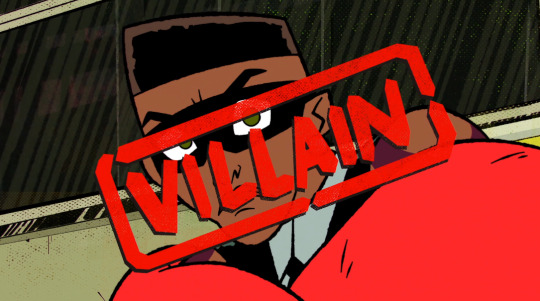
(Taken from my thread on twitter and explained in more detail in here) In this post i'm going to talk about one of the main themes of MGADD Season 2 A, which is, as the title says, redemption arcs and restorative justice. I'm going to analyse different episodes that tackle this theme and how they are followed up in the rest of this part of the season.
Spoilers down below
One of the big themes in MGADD Season 2 A is the idea of how people who are ¨villains¨ have a lot more in them and the reason why they became evil is more complicated than it seems. Also how they have the capacity to regret their past actions and change for the better.
Restorative justice is a whole complex topic, but to put it in simple words: It has to do with the criminal rethinking their past actions and doing something to make amends with the person or people they hurt. It's less about punishment and more about what can the person do to fix their bad decisions and be pushed to be better in the future.
While redemption arcs and restorative justice aren't that rare to find in Disney TVA animated series and other animated shows, emphasis on this theme in superhero animated series is a lot more rare to find in my personal experience.
In superhero shows the line between who is good and bad is very clear. The heroes are good and the villains are evil. Villains are evil because they chose to be or they ¨were born that way¨. The possibility of redemption and rehabilitation is often seen as naive, and at times mocked at. Punishment and incarceration is seen as preferable over rehabilitation in these type of shows.
That's not to say that redemption arcs don't exist in superhero shows, but it is more rare and the idea that villains are just evil is what gets pushed the most.
Quick Whip/ Zekiyah
In MGADD, this idea is being to put into question in Season 2 episode 4 ¨Ride or Die¨ in which Lunella caughts a well known criminal known as ¨Quick Whip¨. Lunella reports to SHIELD that she is going to take Quick Whip there by using a sub train.
While they are on the train, the power goes out for a moment and Lady Bullseye shows up with her followers, looking for Quickwhip, who used to work for her. Lady Bullseye doesn't allow people to ¨get out¨ from her criminal group, explaining why she is here since Quickwhip left it.
Lunella is forced to work together with Quickwhip to power up the train and get away from Lady Bullseye. For a good part of the episode Lunella considers that Quickwhip is only a villain and that's what she would always be.
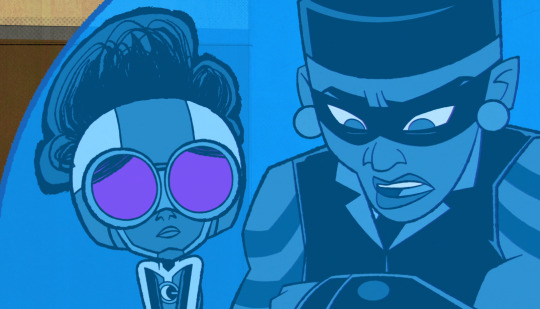
However, in a moment they are hiding from the Diabolical Darts, Lunella learns that Quickwhip's real name is Zekiyah and that she used to be a person who only dreamed of starting a bakery and spent hours every day to study how to make pastry. Once she came to New Work, it was too expensive for her to afford a place and soon she was on the streets.
Lady Bullseye took advantage of Zekiyah's difficult situation and persuade her into joining her crime group. Zekiyah became pretty good at stealing but over time she realized how she strayed away from the path she originally set up for her. She left the Diabolical Darts and has been in the run ever since.
Seeing that Zekiyah had more going on that she assumed, Lunella thinks there has to be other way for her to be more than just a ¨street rat¨ and teams up with Zekiyah to take down Lady Bullseye and her followers. When she is about to give Zekiyah to SHIELD, she talks about how she wants to help everyone, included those who happened to fall in a bad path and asks to try something different this time.
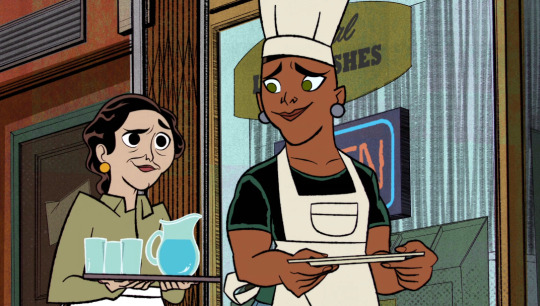
By the end of the episode Lunella reconsiders her views about crime and such and decides to open a program that could help villains who regret their past actions and want to make things right. She gives Zekiyah (Quick Whip) a change to work in a bakery like she wanted originally when she came to New York.
Kid Kree
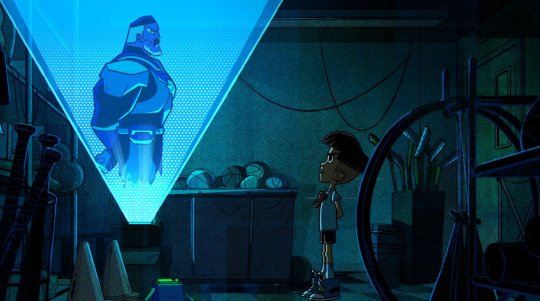
In episode five ¨Kid Kree¨, the one following ¨Ride or Die¨ we are introduced to a new character ¨Kid Kree/Marvin¨, who is original from the MGADD comics. He is a kree teenager that was sent by his father, Pad-Varr, to capture a superhero to prove his worth as warrior after not reaching the expectations on his homeworld planet.
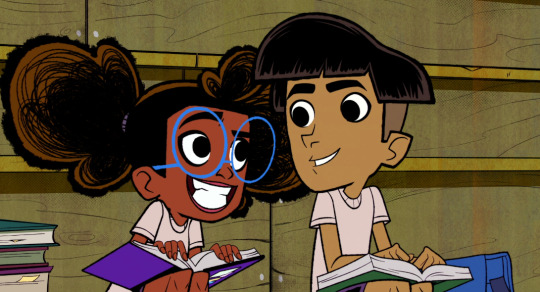
Lunella meets Marvin at his first day at school. During gym class she notices that Marvin shares similar interests in science and math like she does. Overtime the two develop a close friendship over sharing interests and views of seeing the world, happy to find someone else that they can be their ¨nerd¨ selfs with. Lunella because she didn't know much kids from her age that we into same stuff like she is and Marvin since he feels like he can be himself around Lunella.
In meantime Lunella and Marvin continue to fight each other as Moon Girl and Kid Kree, without knowing each other's identity. They have a bit of rivarly, with Lunella trying to come up with new ways to outsmart ¨Kid Kree¨. During one of those fights Moon Girl defeats Kid Kree and he accidentally drops his communicator, the one his father usually contacts him with. Lunella takes and tries to hack into it. She discovers an video recording of Marvin talking about his mission on Earth and revealing that he is Kid Kree when he takes his helmet off.
Lunella gets angry at this and, without thinking too much of the implications, she ends up answering a call from Pad-Varr and tells him that she has defeated Marvin, making Pad-Varr clearly upset.
When Marvin comes to eat dinner at Lafayette's home, Lunella tells to Marvin that she knows about him being Kid Kree by giving him his communicator and adds that she has called his father. This makes Marvin scared and the Lafayettes ask him why he is worried about his own father.
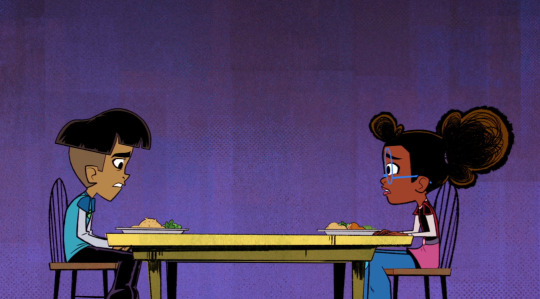
Marvin explains isn't happy at being a warrior and it is forced by his father to be something that he is not. His father doesn't approve of Marvin's preference for science, making their relationship pretty strained. In general Marvin doesn't feel comfortable with being himself on his planet nor with his father. He thought that Lunella was someone who understood him but he is sad that apparently this wasn't the case. He lefts the house upon hearing that Pad-Varr's ship is coming to get him.
Lunella goes after Marvin and apologizes to him for jumping to conclusions about his true intentions. Pad-Varr orders Marvin to catch Moon Girl and Devil, which he does, but moments after he traps his father and later Lunella and Devil helped Kid Kree with standing up to him.
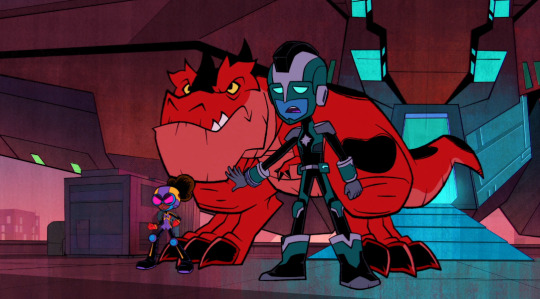
Kid Kree expresses to his father that he doesn't want to be a warrior and he is into science instead. Pad-Varr reconsiders this and praises Marvin for his gadgets, telling him that they could be useful for the Kree Empire. Lunella and Marvin remain as friends and keep in contact with each other.
Marvin appears in other episodes like ¨In The Heist¨ and ¨Dancing by Myself¨ where he helps Lunella in different ways and their friendship continues to develop. While Marvin is stil working for the Kree empire, it is likely that he will turn around, like he does in the comics.
With Kid Kree's case, Lunella realized what Marvin was going through and inspired him to stand up against his father to be himself. She made the error of doing some rushed decisions when she found out that he was Kid Kree and apologized for it, both staying as close friends so far.
The Beyonder
In episode ¨Wish Tar¨ the Beyonder shows up again to visit Lunella by showing up from the Wish Tar machine James got from Coney Island. He doesn't understand why Lunella is being hostile towards him, which leads to Lunella and Casey to remind him of the times he messed up with them.
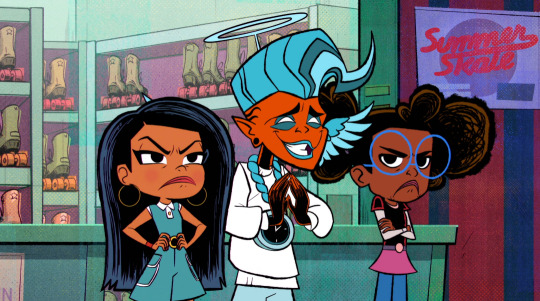
The Beyonder explains to the girls that he has been reflecting since the events from ¨The Great Beyonder¨, when he and Lunella spent days stuck on Molecular Man's destroyed planet and worked together to escape. He also started to see Lunella as a sort of friend after that episode. He wants to makes things right with Lunella but she asks him to leave before he makes things worse.
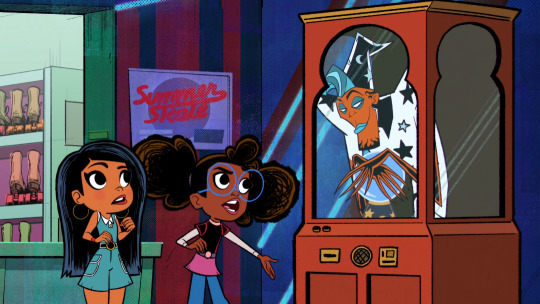
Later Lunella finds out that a wish she had asked for the Wishtar machine has been granted. Both her and Casey get suspicious about this event and go back to Roll With It to check the machine. It turns out that Beyonder is the one that granted the wish. He tells them that he ¨wants to be a good friend¨ for Lunella by making her wishes become true. Lunella sees the benefit of the wishes and decides to give it a try.
In this episode we see Beyonder using his powers to help Lunella, or at least to be a ¨good friend¨. He has good intentions of be someone better than he was in previous appearances. The problem is that this power goes up to Lunella's head, who ends up taking advantage of Beyonder's good intentions and they have a falling out with him disappearing after Lunella lashes out at him.
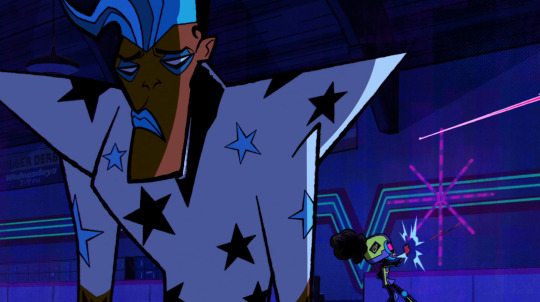
While Beyonder had good intentions, his approach wasn't the best since he still has yet to understand how human friendship works. Granting all Lunella's wishes just lead to her take advantage of it and not so much appreciate what Beyonder was trying to do.
From Lunella's part, some of her reactions are understandable since Beyonder did some bad things to her in more than one occasion. In spite of being on friendlier terms after ¨The Great Beyonder¨ she was still angry at him for the things he did in the past. However, as mentioned earlier, the way she used him and lashed out at him was pretty dirty considering that this time Beyonder was trying to be good.
In contrast to Kid Kree, Lunella and Beyonder's friendship took a bad turn and Lunella would have to find a way to apologize to Beyonder for how she lashed out at him. Beyonder has still growing to do, but the fact that he was trying to use his powers to be nice was a good start.
Other episodes worth of mentioning that continue this theme more or less are ¨The Devil You Know¨ and ¨Dog Day Mid-Afternoon¨.
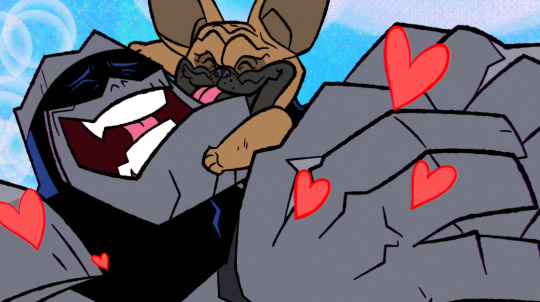
In The Devil You Know Devil joins a group of sidekicks called the ABC that feel mistreated or underappreciated by their heroes-owners. Near the end of the episode it is shown that the conflict was a miscommunication problem and that, in fact, the heroes love their sidekicks.
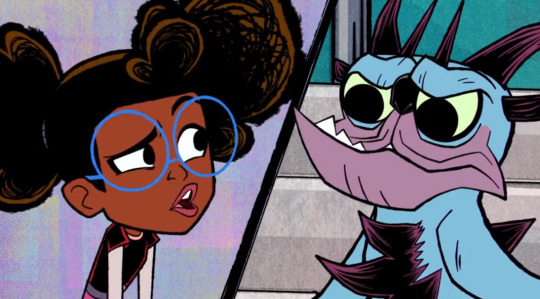
In the Dog Day Mid-Afternoon Lunella jumps to the wrong conclusions about the dog alien Pops adopts (later named Franklin) being a villain. Later Franklin reveals that he is a space hero and he was on an undercover mision to find the real villain who was stealing dogs using a powerful dog wistle. Lunella and Franklin team up and work together to defeat the main antagonist.
Molecular Man's return.
All this development in Lunella's character in this arc has a conclusion in ¨The Molecular Level¨ when Molecular Man shows up in Lafayette's house and attacks Lunella and her family since Lunella is ¨someone Beyonder cares about¨.
Molecular Man was introduced in ¨The Great Beyonder¨ as someone who suffered the loss of his planet, becoming a wasteland, thanks to the Beyonder's antics. He wants to get revenge on Beyonder for what he did to his planet, being the reason of why Lunella and Beyonder are stuck in that place for days.
He destroys a good part of Lunella's house through ¨The Molecular Level¨ and endangers the Lafayettes. When Lunella finally finds her suit she is able to fight back and defeat him, leaving his body broken.
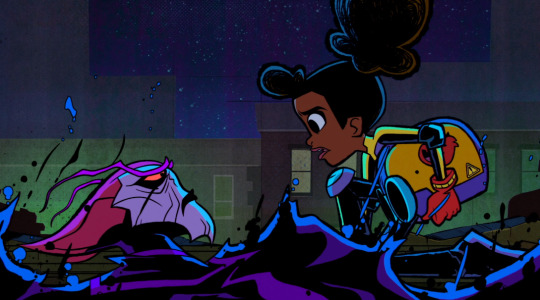
When she is about to give him the final blow she is reminded of how Molecular Man lost everything to the meteor shower thanks to Beyonder and feels sorry for him. She understands that he went through a lot and gets why he was so angry.
Molecular Man sees Lunella's compasion and says that he is really sorry for attacking her and her family. He admits that he let himself be destroyed by his desire to make others feel his own pain and anger.
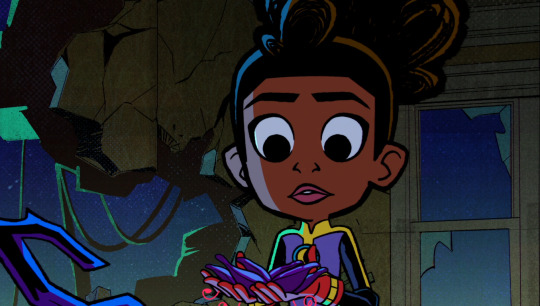
Lunella gives him a piece of her self repairing suit so he is able to heal himself and get his powers back. Molecular Man thanks Lunella for understanding and uses his molecular abilities to repair Lafayette's home and heal Pops's broken arm. He promises himself to use his powers to rebuilt his planet from scratch and leaves, saying goodbye to Lunella.
¨The Molecular Level¨ serves as a good conclusion for this part of Lunella's arc in this half of the season. She has grown enough to understand that sometimes people are driven to do bad things for certain reasons. The world is often more complex than it seems to be and there aren't just ¨good¨ and ¨bad¨ guys. She applies the lessons she learned with Molecular Man by showing she gets what he went through and inspires him to use his powers to heal in the future.
#moon girl and devil dinosaur#mgadd season 2#lunella lafayette#the beyonder#Mgadd kid kree#MGADD quickwhip#Mgadd Molecular Man
80 notes
·
View notes
Note
trick or treat 👻🎃❤️
thank you @whinlatter 💕
you get a snippet of my shitty first draft of the Beasts tribute fic i started. for non-whinlatters, Beasts is her absolutely astonishing Ginny & the Weasley family fic that follows her postwar seventh year at Hogwarts, intertwined with glimpses of her development as a child & teenager, and there's a brief mention of a care facility where recipients of the Dementor's kiss live out the rest of their lives. Highly recommend this fic - it's just such a rich portrayal of the whole Weasley family, the fraught rebuilding process after the war, and Ginny's emotional & intellectual life.
tw: illness, death, and very unpleasant hospital stuff
this idea of what happens to people after they've been kissed by a dementor really spoke to me for a few reasons - i couldn't help but think about some of the things i've seen in my professional life. i work in a healthcare specialty i can't really name without potentially doxing myself (it's a small world) and early in my career i occasionally participated in testing to determine death by neurologic criteria - essentially, flat lines on an eeg, which is a really terrible thing to see if you know what you're looking at. it's a difficult thing to even comprehend, especially for a parent - that a child who was splashing in the pool a few hours ago, now seemingly asleep, will not wake up, is damaged so profoundly that they they will never take another unassisted breath. i also regularly worked with people who were incarcerated in the state prison system. it taught me a lot about - let's keep it short and just say inhumanity: in the american healthcare system and especially where it intersects with the criminal justice system, and, unfortunately, in some of my colleagues and the way they cared for their incarcerated patients.
in my current role i work with a lot of patients who just aren't going to get better, who are entirely dependent on caregivers to keep them alive and maintain their quality of life. and it is - i hope you'll understand when i say this i say it as someone who is devoted and privileged to do it - often difficult and demoralizing work. for families and for staff.
my youngest sister was one of these people: she suffered a hemorrhage in infancy which resulted in serious damage to her brain. she never spoke, walked, fed or bathed herself. it was difficult to know what she understood, perceived, felt, wanted. she was a beautiful, calm, sweet-natured child who was easy to love; not every family in our position is so fortunate. it was also easy for us to project on her an interior life that may or may not have really been there, which was a great comfort to my mother. but her daily care needs were enormous, taxing, frustrating, and her inevitable deterioration and death were devastating to witness.
obviously i don't really want to equate people with brain injuries and whatever other special needs with people in the hp universe who no longer have souls - that's part of the reason i've struggled with this fic. there are a lot of potentially-unanswerable questions about the humanity and interiority of victims of soul-removal in this fictional context, but i think the only responsible practice for a clinician working with such patients would be to assume that they still feel, experience, and need what any other person who cannot care for themselves would. including not just nutrition, hygiene, etc. but also company and touch and positive regard. and that whatever crime, even atrocity, they might have committed is irrelevant to my duty to them as a caregiver. but that is easier to say than to do, consistently, every day, at home or in a medical facility, and i know from experience that it won't always happen that way.
anyway, if for some reason you have read this far, here's an excerpt from the story, complete with first-draft placeholders where i decided to rethink some dumb on-the-nose character names, lol. it needs to be rewritten from scratch, honestly. it's set at the end of GoF, when Madame Pomfrey is tasked with removing the house-elf Winky from Barty Crouch, Jr.'s side after he has received the kiss, and I've decided for the purposes of this silly little fic that she has experience in the care facility where he'll end up.
working title is My Beautiful Dead Friends.
Minerva saw the whole horrible thing and it was all over her face, what it had done to her. Poppy has never seen it happen, and neither had [supervisor], which seemed to irritate him; he'd read about it in books. The soul emits a colourless glow as it exits, he said, visible for an instant before it is consumed. For some time in the eighteenth century the Kiss was performed in public, on a platform raised above Diagon Alley. People would bring their children. There were woodcuts depicting the moment, dementors in swirling curlicues, the bound hands and dark mouth of the convicted, and the soul, represented as a star or sometimes a tiny naked man, caught in the moment of transit. It was striking how carefully, how delicately, the little soul was etched, with lines of light coming off it. Even the soul of a murderer, a beautiful shining thing. Minerva had marched Barty to the infirmary dozens of times in his schooldays. Sometimes because Horace wasn't fond of the long walk, nor of standing up to his own students, but often because it was one of her Gryffindors who'd done it to him. He was there all the time, hexed, cursed, punched in the face. It seemed, at first, simply the lot of the delicate-featured son of the head of law enforcement to be regularly trounced. He gave at least as good as he got and sometimes there'd be an entire queue of students behind him covered in boils, missing or extra limbs, pinching their nostrils to stop the bats from flapping out. Barty might chuckle through a mouth of blood while she saw to him, or he might writhe and moan as if in agony; Poppy had a suspicion that it depended on whether there was a Hogmeade weekend or an exam coming up. It wasn't only the usual interhouse skirmishes with Barty—Once, he limped to the hospital wing on his own, so badly beaten she had to put him out for a while and repair his perforated intestines with dozens of tiny movements of the tip of her wand. When he came to, she asked him what had happened, who had done this. He grinned at her with half his teeth gone. "Jusht the cosht of doing businesh, Madame," he said. Bubbles of red on his lips as he spoke. She found out later from Filius that he'd scammed a bunch of Ravenclaws into a sort of pyramid scheme, buying and reselling junk from Zonko's to each other. She was sure he didn't need the money: his robes were clasped with real-silver fasteners in the shapes of snakes. His mother came to take him home for the weekend after that one. He pressed the side of his face into the bosom of her robes and sobbed pitifully while Poppy left them to it behind a screen. On his way out the door, later, he waved to her, like, see you soon! Now he looks content, drowsy, like he's just had a meal. It was always hard to square the faces of the Kissed with what they'd done. Barty could almost be his seventh-year self, resting in the lull of a potion—though he might have already been a murderer by then, she realised. His hands, which had once aimed waves of pain so brutal they'd evicted poor Alice and Frank Longbottom from their own minds, are laced together at rest on his stomach. His thumbnail picks occasionally at the wand-callus on his forefinger. Some unlucky trainee healer will be alarmed by that one day. The Kissed do those little things. Their eyes follow you, sometimes, across the room. They smack their lips when they swallow the bubblemint-flavoured nutrition potion. They sit up in bed. "Look—he's doing it—I've told you—" Llanzo's mother had once cried, summoning the whole staff to come and see. She was tickling Llanzo's ribs with her fingers, and his lips had pulled back, his chest was jerking with spasms of laughter, no sound but a sort of clicking in his throat. "It's a reflex," [supervisor] told her. Llanzo's younger brother slumped in his bedside chair and stared sourly at his mother. She got angry, understandably, and shouted a bit before storming out.
"A rat will make a rhythmic sound if you tickle its belly," [supervisor] told Poppy in private. "You can call it laughter, if you like."
Llanzo was the only one who ever got visitors. He'd been accused of leading a nine-year-old witch away from her parents at Gray's beach and leaving her face-down, strangled, in the shallow mud of the Thames. His mother had given an alibi, which wasn't enough to keep him from being arrested, and he'd been shipped off to Azkaban to be held pending trial. As they'd approached the jagged rocks of the island he'd broken his bonds somehow and heaved himself over the side of the boat. Escape, suicide, or just some motiveless panic, it wasn't clear, but when they'd caught him and hauled him onshore the Dementors had fallen on him at once. He was seventeen, on his summer holidays. Lying in bed on the ward a year later he still looked like a child. Poppy wasn't sentimental, as a rule, but at the end of shift after those visits she'd sometimes have to have a little cry in the car park before she apparated home. "If you ask me I think she's on to something," Catherine told her once, in low tones, eyes on [supervisor]'s office door. "I've seen things. The way they look up at you. You can leave them on the pot for an hour, they won't do a thing, then as soon as they're back on the bed, haven't even had time to get a nappy out—" she made a squelching sound in her cheek. "Pure spite, I swear."
His mother came back the following week, brother in tow, and sat with him reading from Quidditch Through the Ages, turning the book to show him the moving illustrations. Sometimes his gaze moved to land on them and sometimes it didn't. "He was a Chaser," she told Catherine, who'd come to give him a bath. "Fast as anything. His Dad and I were both hopeless on a broom, but he's—" She swallowed hard. Llanzo was smiling faintly, as he often did when he got his bath. His breath came in soft vocal sounds that were almost sighs. "—he's my superstar," she finished. When they left, she made his brother say goodbye to him. Poppy was scrubbing up at the bedside sink to do his skin integrity assessment. Llanzo's brother gripped his hand, and leaned down as if to kiss him on the cheek. "Fucking die," he whispered, lips almost touching Llanzo's motionless face.
38 notes
·
View notes
Note
Nobody should have to choose between life incarcerated and death? Is death not potentially the path of least harm? Is the act of providing choice not ethical? Is a life incarcerated not simply a drawn-out death sentence? What would be your ideal scenario for violent criminals? Serial killers and the like?
nobody should have to live a life incarcerated. do you genuinely think that prisons prevent people from being harmed? that they prevent serial killers? that they don’t harm people & their communities further? that cops keep us safe? do you genuinely think that the people who suffer the worst from the cruelty of the prison industrial complex are people who have, for example, committed mass murders (who i also don’t think should be executed by the state)?
incarceration is an inherent violation of autonomy and choice. purposefully making someone’s life so unlivable that they might theoretically choose death isn’t a mercy, it’s just another form of state violence (& i’d also argue if there were a precedent for this hypothetical we’d get into eugenicist territory very quickly)
why does this discussion not make you rethink your thoughts on the the inhumanity & cruelty of prisons?
why do you fundamentally trust that it would ever (or has ever been) safe for the state to determine who lives & who dies?
#also like read the fucking article your takeaway shouldn’t be ‘oh they should have killed him#more efficiently’#it should be ‘this man should not have been tortured and killed’
16 notes
·
View notes
Text
Thinking some more about society and punishment and prison.
PI’ve mentioned before that I work in a homeless shelter, that I generally really like the women here and think they get a bum deal from life and it’s good to assist them, etc. most of them are kind and friendly people, though I do notice they tend to be stressed and can get angry or fight at times. Maybe mental health, maybe just being in shelter absolutely sucks, I dunno, I don’t really blame them though of course I try to persuade them to find solutions that don’t disrupt or endanger others or themselves.
So I wanted to bring this up just because… I think people realize that people like this exist, but don’t always have people like this in mind when they talk about systems they dislike.
R has a history of incarceration, I don’t know what for much less have opinions on whether it’s deserved. But I know about it because when she met with me she was calling them to get medical records, as she suffered lasting/disabling injuries in a car accident some years back. She was very rude to them, insisting that they should have the records when they said they weren’t sure how old the records might be and getting belligerent when they recommended she come back in for a new initial appointment since they couldn’t find anything.
After about I don’t know a month of not coming back in, she came back to see me, demanding that she have several pillows to sleep. I let her know that the usual procedure of someone needs special bedding is to see the doctors who visit here twice weekly and have them sign paperwork attesting to the need, and that she could do that in the morning. If it’s approved, which it probably will be in a matter of days, then she can bring however many pillows it says. (I wrote four, after asking repeatedly which limbs and joints were affected so I could argue she needs to support each.)
She didn’t like that, but she can’t go to see her GP sooner so she agreed to do that. I filled out the paperwork for her and marked specifically where she needed a doc to sign. Told her 9am, that I have afternoon Saturday shifts and she could drop it by as soon as I get in and I’d send it on immediately. Etc.
Well. 1am rolls around (I happened to be awake and getting into bed) and one of the security staff says in chat that R told her her accommodation was approved and that she can bring in a whole set of sheets and wash them herself. My boss, not having looked in the notes from 8pm, was like “she needs to go see Fierce about that first.”
Argh.
…My point is not “this person went behind my back so she deserves punishment grrrrrr grrrrr.”
She did go behind my back, and that’s annoying, but I clearly explained and the súper has my back. It’s fine.
But my point/question is: how does the new system handle stuff like this, where people don’t really appear to rethink this kind of behavior? Do we just shrug and take it, or is there a point at which we punish it, just so that consequences happen?
That’s the thing I feel like people are persistently not addressing. That some people really do seem to have a pattern of acting this way, and it’s not clear that being patient or friendly to them is likely to convince them to stop. At least not unless you’re unfailingly kind for syc( a length of time they really stop and think.
Which is time not everyone actually has.
4 notes
·
View notes
Text
In this episode, host Vanda Felbab-Brown talks with RAND researchers Beau Kilmer and Roland Neil about U.S. domestic law enforcement responses to the fentanyl crisis. Kilmer and Neil highlight a decline in drug arrests, particularly for cannabis, in the United States, but note a surge in fentanyl-related seizures. They also discuss various alternatives to incarceration for specific drug-related crimes, including police-led deflection programs, and they cast skepticism on new punitive approaches, such as drug-induced homicide laws.
2 notes
·
View notes
Text
Earlier this year, the leading psychological association in the United States apologized to the country’s Indigenous people and communities for directly and indirectly supporting centuries of abusive assimilation efforts. Those efforts included pushing Indigenous people off their lands and separating children from their families for placement in boarding schools.
The harms of these practices to Indigenous communities are ongoing, the American Psychological Association acknowledged in a report released in February. For instance, culturally inappropriate mental health diagnoses and treatments have exacerbated Indigenous communities’ already disproportionately high rates of mental illness, chronic disease, incarceration and suicide.
13 notes
·
View notes
Text
That one time Death Note Creator's Assistant made a Hentai
L : Hey, guys! Look what we found in our author's ex-assistant's stash!
Misa : Wow, what is it?
Light : What's that?
L : I just found a new work from the author's ex-assisstant and I discovered this. Majo wa Kekkyoku Sono Kyaku To!
Light : Wow, something rare for us that it could much cool for the japanese skin-flick industry. I wonder what it is?
L : It's a adaptation of the Manga made by our author's assistant. It's got a good story of a witch and young boy. I wonder if it's like getting a cool look on the skin?
Misa : Let's pop it in, shall we!? (Inserts DVD) Wow! I can't wait to see author's assisstant's adaptation of his manga. It'll be just like the good old days.
L : Precisely.
Light : Yeah, what did I tell you about his new work that is a witch and a boy, it's not like that our author's assisstant has made a witch doujin that is a pornographic comic...?
L : Uhh, guys? Is that a boy making out with a witch and...
Misa : And is the witch being lewded by...Oh God! WHAT KIND OF ADAPTATION IS THIS!? (Ejects DVD) DUDE! THIS IS A PORNO ADPAPTATION, YOU GUYS! OUR AUTHOR'S ASSISSTANT MADE A HENTAI MANGA! WHAT THE F***!?
Light : See? I told you that was adaptated in the Skin-flick industry! I told you about it and you wouldn't listened.
Misa : Oh man, I thought that we would never see a witch and a boy having sex from our author's assisstant adaptation of a hentai manga, including with the DVD as well.
Mello : Hey you, turds! Majo wa Kekkyoku was from my porno stash!
Misa : Oh no! It's his stash! Run! *ZOOM!*
Mello : Wait, till I get my hands on you!
Light : Lesson learned, never take one's stuff from a stash of skin-flicks. I wonder how Hentai Characters like them would participate in Real World AU for theirselves?
"Meanwhile..."
Kaoru Enma : So, Magical Mojikawa, first time being a witch in a hentai like all the other witches in Real World AU?
Mojikawa : I only existed here it's because I was made by a Shounen Jump Mangaka that was the assisstant to another famous mangaka who created the world's legendary jumper that's write people's name in a notebook that kills them.
Kaoru Enma : What does Shonuen Jump have to do with the hentai stuff, that's not like it's going to be a lost cause in the hentai-industry. We always do things in the industry, can't back sh** now since we captured those Gorgon Sisters for their crimes against humanity where they could be incarcerated at Boston.
Mojikawa : I see your point tho. Guess I'm just another another witch in a hentai, that all figures.
Mashima Mojikawa : Oi, Oi, care for to go another round and get our selves laid tonight at the city of Salem?
Kaoru Enma : Just shut it and finish your drink. I got enough problems to solve right after I deal with Sakae Aiba from his dirty needs.
Mojikawa : We're you absuing a boy?
Kaoru Enma : Not your best one, but it's for the best I made him my pet.
Mojikawa : You are a master of slavery and kinda hot for to be this appealing for a witch's body.
Kaoru Enma : Guess your's have to be appealed next after we get your work visas and passports done by the end of this week.
Mojikawa : Yep, life as a witch is great, but being in a hentai is sure a mystery.
[Iris out]
[Course Clear (NSMB Ver.) - Koji Kondo]
"AND NOW YOU'LL KNOW!"
Mario : That's-a so nice! (deathly grunts)
*Samurai Jack SFX : Collapse*
Light Yagami : There he's dead, ya happy now?
Misa : Yeah, still rethinking on that hentai stuff.
#death note#super mario bros#takeshi obata#shounen jump#nintendo#studio madhouse#crossover#comedy#dark comedy#humor#dark humor#funny
2 notes
·
View notes
Text
“The way the United States approaches prison tourism re-inscribes the kind of politics that support mass incarceration,” said Jill McCorkel, a professor of criminology at Villanova University. “It turns human suffering into a spectacle.”
--
Robert S., an incarcerated man at SCI Chester, said he doesn’t have a problem with prison museums, but organizers should make sure that people have an understanding of the effect on the people who were housed there. “The museum is for amusement, but this was someone's pain,” he said. “This was someone's struggle. This was someone's life. It wasn't amusement to them.”
2 notes
·
View notes
Text
Ship Out the Worst: Why Britain Should Export Its Most Dangerous Prisoners
Summary: Britain is spending a fortune housing violent, long-term prisoners — some of whom treat prison as a permanent home rather than a punishment. With the prison population rising and costs climbing, it’s time for a bold rethink: offshoring incarceration. By partnering with low-income countries that need jobs and infrastructure, Britain can transform its foreign aid budget into a new model —…

View On WordPress
0 notes
Text
Documentary Storytelling: How Films Influence Public Perception and Drive Change
Documentaries have long been celebrated as art that blends storytelling, truth-telling, and visual communication to shape public perception. Their ability to present complex issues in a compelling narrative makes them an essential tool in entertainment and education. Over the years, documentaries have evolved from simple informational pieces to multifaceted productions that engage audiences emotionally, intellectually, and morally. Whether they aim to inform, challenge, or inspire, documentaries possess the power to influence how society views historical events, social movements, and cultural shifts.
Documentaries as Agents of Change
The true power of documentaries lies in their capacity to incite change. Through their storytelling techniques, these films can shed light on issues that may go unnoticed or be misunderstood. By focusing on real-life subjects—environmental destruction, social injustice, or political corruption—documentaries create a sense of urgency among viewers. They turn complex issues into personal stories, allowing audiences to connect emotionally with the individuals and communities affected. This emotional connection often sparks action through protests, donations, or a shift in public policy.
Take, for instance, An Inconvenient Truth, Al Gore’s 2006 documentary on global warming. The film educated the public about the urgency of climate change and positioned environmental advocacy as a key issue in the political landscape. Through powerful visuals, expert testimony, and Gore’s passionate narrative, the documentary reframed global warming as a moral and scientific imperative, encouraging individuals and governments to act.
The 2013 documentary 13th, directed by Ava DuVernay, explores the intersection of race, justice, and mass incarceration in the United States. By delving into the historical roots of racial inequality and examining how the prison system perpetuates these disparities, 13th challenged viewers to rethink their understanding of race and justice in America. The film highlights the power of documentaries to reshape societal narratives and offer new perspectives on deeply entrenched issues.
Crafting the Narrative: The Techniques Behind Documentaries
The success of a documentary in shaping public perception hinges on its narrative structure. Unlike traditional films, documentaries are rooted in fact, yet they still employ narrative techniques commonly found in fiction. Filmmakers carefully craft their stories to elicit emotional responses and to persuade viewers of their perspective.
A key element in documentary storytelling is selection. How facts and events are presented can significantly influence how audiences interpret the information. Documentaries often focus on specific individuals or events to illustrate a more significant issue, carefully curating moments that best express the filmmaker’s point of view. Carefully selecting archival footage, interviews, and personal stories creates a compelling narrative that guides the viewer's understanding of a subject.
For example, in Won’t You Be My Neighbor? (2018), director Morgan Neville uses archival footage of Fred Rogers, the beloved host of Mister Rogers’ Neighborhood, to craft a portrait of a man who advocated for kindness, empathy, and emotional intelligence in children’s television. By focusing on Rogers’ interactions with his audience and behind-the-scenes moments, the documentary humanizes its subject and underscores the positive impact of his work. Through this lens, viewers are not just learning about a person—they are emotionally drawn into his message of love and acceptance.
Another essential tool used in documentaries is the interview. Expert opinions, personal testimonies, and direct engagement with subjects create an intimate connection with the audience. The power of personal testimony, in particular, allows for a more immersive experience as viewers hear firsthand accounts from those directly affected by the subject matter.
In The Cove (2009), a documentary about dolphin hunting in Japan, the filmmakers employ hidden cameras and interviews with activists to expose the brutal practices behind closed doors. The powerful imagery and heartfelt testimonies of those involved in the anti-hunting movement push viewers to confront uncomfortable truths about humanity’s relationship with nature. The film's emotional impact is heightened by the way the filmmakers use suspense and surprise to reveal the harsh realities of the subject matter.
Shaping Public Perception: The Role of Documentary Filmmakers
Documentaries play a significant role in influencing public perception, and filmmakers are acutely aware of their power. Whether tackling contentious political issues or exploring untold histories, filmmakers can frame a narrative that resonates with audiences globally.
Filmmakers are often driven to shed light on stories overlooked or marginalized by mainstream media. Their work challenges preconceived notions and encourages viewers to engage in critical thinking. However, it is essential to note that documentaries are not without bias. Like any form of media, they reflect the perspectives and values of their creators. As such, audiences must approach documentaries critically, acknowledging the filmmaker's role in shaping the story.
The documentary Fahrenheit 9/11 (2004), directed by Michael Moore, is a prime example of how filmmakers can use their work to sway public opinion. By presenting a controversial viewpoint on the War on Terror and the presidency of George W. Bush, Moore crafted a narrative that resonated with those critical of U.S. foreign policy. The documentary sparked heated debates and garnered widespread attention, proving that documentaries are not just passive entertainment—they can catalyze political change and social discourse.
The art of storytelling through documentaries is a powerful tool that can shape public perception, inspire change, and challenge societal norms. Blending factual information with emotional engagement, documentaries create compelling narratives that resonate with viewers long after the credits roll. Whether focusing on environmental issues, social justice, or personal triumphs, these films offer audiences new perspectives and insights into the world around them.
Through careful curation of facts, expert interviews, and personal stories, documentaries possess the ability to not only inform but also to provoke, inspire, and ultimately change the way we view the world. As long as there are stories to be told, documentaries will continue to influence public consciousness and encourage meaningful conversations.
0 notes
Text
Blog Post week 3
The Negatives of Technology
How do Eubanks, Jessie Daniels, and Nicole Brown each address the issue of technology reinforcing systemic inequalities, particularly concerning marginalized groups like the poor, women, and people of color?
All three authors critically examine how technology often adds to existing social inequities. Eubanks focuses on how automated public service systems continue harming the poor by ignoring individual circumstances and reinforcing social class imbalance. She explains that algorithms used in welfare systems can profile and punish the poor, which helps continue the pattern of inequality dating back to the 19th century. Daniels criticizes early cyberfeminists who believed the internet would automatically free women from gender inequalities. She argues that this optimistic view ignores the fact that digital platforms can repeat and worsen these inequalities, especially affecting women of color. She also believes that online spaces are not neutral and that they are shaped by male-dominated and racist power structures. Nicole Brown talks about how technology embeds racial biases, particularly through data sets that reflect historical inequalities. She discusses how technologies like facial recognition and predictive policing target people of color, and she mentions how the algorithm isn't unbiased because It has favored a sick white patient over a much sicker patient of color thereby reinforcing systemic racism. (Brown, N. Race and Technology, 1:43) It also All three authors argue that technology, rather than being an unprejudiced tool, often mirrors and increases societal biases against marginalized groups.
In what ways do the authors suggest technology can be used to challenge or dismantle existing power structures that oppress marginalized communities?
Each of the authors recognizes that while technology can oppress, it also has the potential to empower and give a voice to marginalized groups. Eubanks believes that by redesigning automated systems to be more humane and attentive to individual needs, technology can help the poor instead of punishing them. Daniels mentions that modern cyberfeminism uses a confluent approach to challenge gender norms and uplift marginalized voices online. She believes that when feminists critically engage with technology, they can undermine systems run by men and create more inclusive digital spaces. Nicole Brown highlights that technology can support social justice movements like Black Lives Matter, The Me Too movement, and other positive promotions of social change by providing platforms for organization and awareness. She spoke for including diverse voices in tech development to create technologies that dismantle racial inequalities rather than reinforce them.
How have these biases in technology affected real people in their daily lives? Due to facial recognition having a higher incorrect percentage of facial identifications it has caused an innocent Jersey man to go to jail. He was nowhere near the crime, 30 miles from the incident yet he was still incarcerated. Instead of being tools that assist in making processes more efficient or accurate, these flawed technologies sometimes become yet another tool of discrimination, turning people into victims of machine error and the biases embedded in them from the engineers.
Daniels, J. (2009). Rethinking cyberfeminism s: Race, gender, and embodiment. Women's Studies Quarterly, 37(1/2), 101–124.
Eubanks, Automating inequality Intro, 9-27.
Race and Technology: Nicole Brown (2020).
0 notes